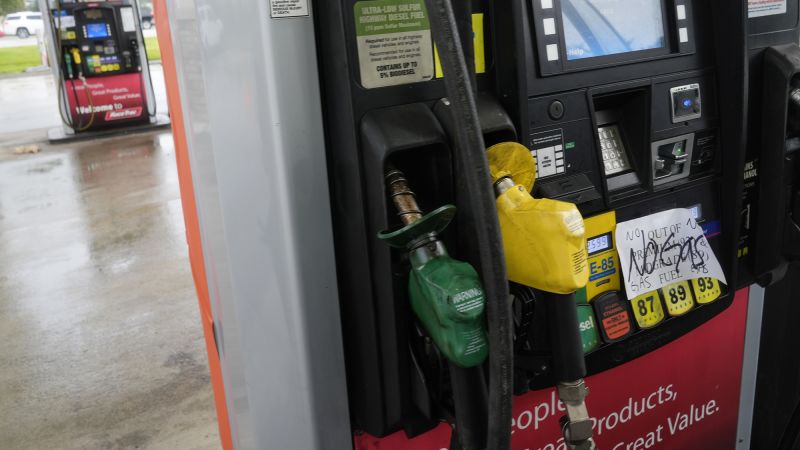Gas stations in Florida are experiencing a shortage of gasoline as residents prepare for the arrival of Hurricane Milton. The surge in demand for gas is due to the need to fuel up before evacuating for some residents in Milton’s path, as well as those planning to stay put and power generators in case of electricity loss. Gas price tracking service GasBuddy reported that 14.5% of gas stations statewide were without fuel, a significant increase from just 3% the day before, indicating more than 1,000 stations are currently in need of gasoline. In Fort Myers, 70% of stations were without gas as of Monday night, showing the severity of the situation in areas facing mandatory evacuation orders.
Florida Governor Ron DeSantis is trying to prevent panic buying and topping off tanks from exacerbating the shortages. He reassured residents in a press conference that emergency supplies of gasoline are being brought to stations that have run out. The state’s reserves include 110,000 gallons of gasoline and 268,000 gallons of diesel fuel, with 1.2 million gallons of both fuels currently en route to the state. DeSantis mentioned that 27 fuel trucks were escorted by the Florida Highway Patrol to deliver fuel to stations in the storm’s expected impact area, emphasizing that there is no fuel shortage, but stations are running out quickly due to high demand.
After Hurricane Milton passes, obstacles in getting gasoline into the state may persist if the Port of Tampa suffers damage. The port is a crucial entry point for gasoline via tanker or barge, which is then distributed throughout the state by tanker trucks and a pipeline leading to the Orlando area. With no pipelines bringing fuel from refineries on the Gulf Coast or northern states, Florida heavily relies on the Port of Tampa for gasoline supply. Experts warn that damage to the port from the storm could lead to difficulties in receiving fuel, impacting the state’s overall fuel supply chain.
Despite the closure of the Port of Tampa due to the storm, it has gasoline at its terminals and continues to operate ahead of the storm. Reopening to tankers and barges may take time after the storm passes, as the Coast Guard needs to ensure the channel is clear of debris and navigation buoys are returned. There are concerns about significant damage to the port from Hurricane Milton and its storm surge, potentially interrupting the ability to receive fuel. State officials are working on alternative arrangements to ensure fuel supply into the state, considering the potential impact on the Port of Tampa.
Gasoline market experts emphasize the Port of Tampa’s critical role in supplying fuel to Florida and its vulnerability to hurricane-related damage. The dependence on waterborne supply and susceptibility to storm surges make the port a crucial piece of fuel infrastructure in the country. With assumptions of significant damage to the port, state officials are preparing for potential disruptions in fuel supply and are making efforts to secure alternative means of getting fuel into the state. The situation highlights the importance of maintaining critical fuel infrastructure during natural disasters and the need for contingency plans to ensure adequate fuel supply for residents and emergency response efforts.













